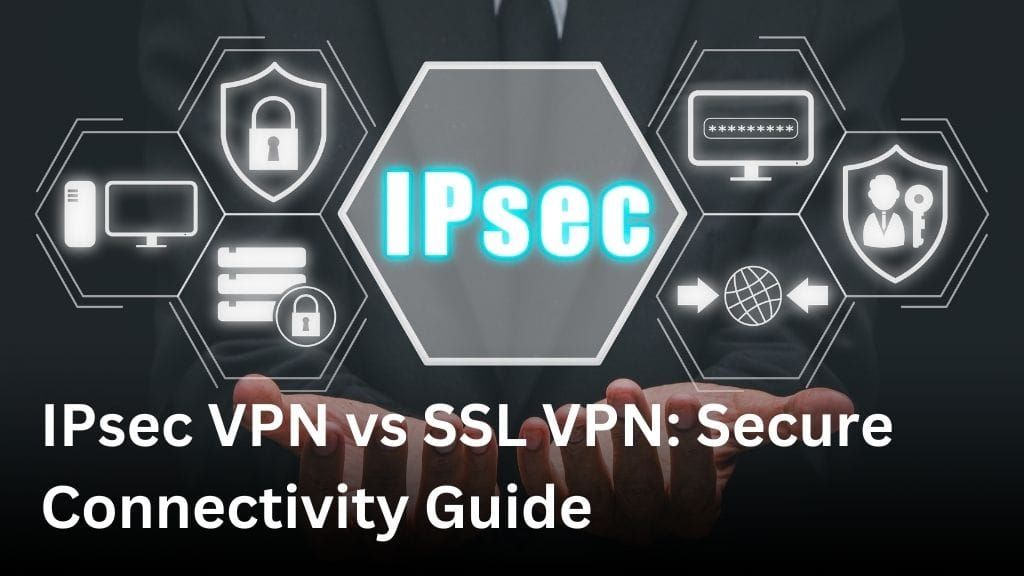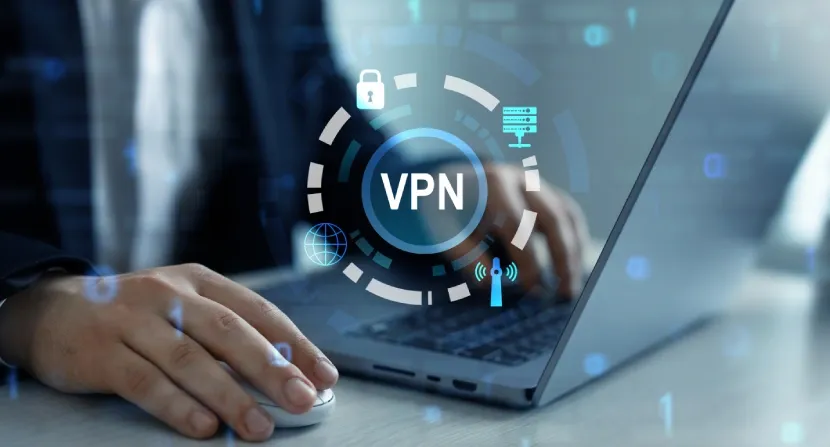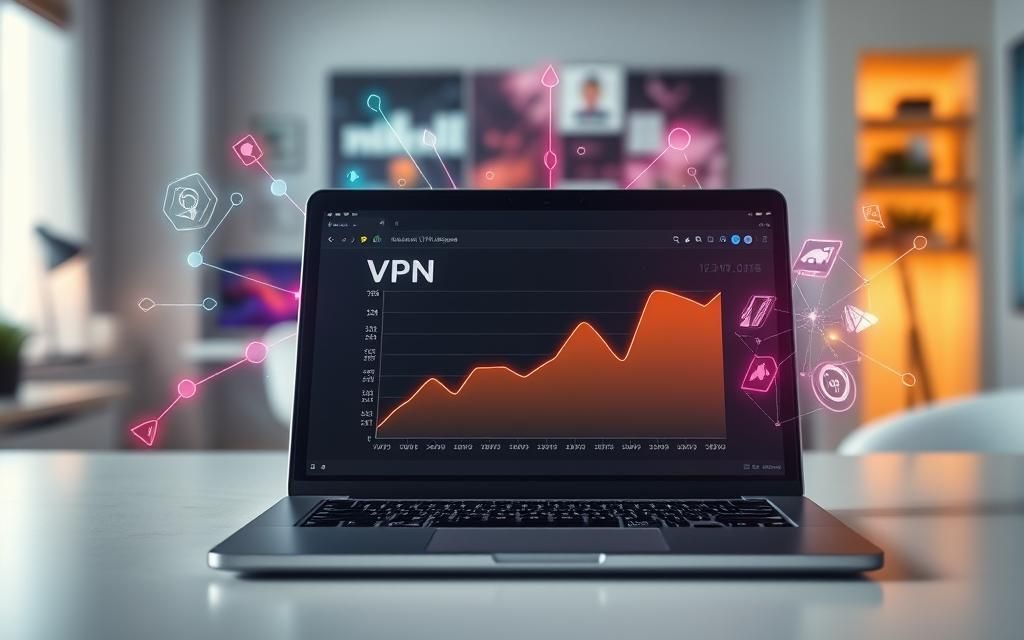Welcome to our comprehensive guide on IPsec VPN vs SSL VPN! In an increasingly interconnected world, secure connectivity is of utmost importance. Whether you are a business owner, remote worker, or simply someone who values privacy online, understanding the differences between these two VPN technologies is vital. In this guide, we will delve into the intricacies of IPsec VPN and SSL VPN, comparing their security, performance, and encryption protocols. By the end, you’ll have all the insights needed to make an informed decision about which type of VPN is best suited for your specific needs.
Table of Contents
ToggleUnderstanding IPsec VPN

In the realm of secure connectivity, IPsec VPN stands as a powerful solution that offers robust security features, reliable performance, and advanced encryption protocols. In this section, we will explore the intricacies of IPsec VPN and compare them with SSL VPN to highlight the unique advantages it brings to the table.
Security Features
IPsec VPN ensures a high level of security by establishing an encrypted tunnel between the user’s device and the remote network. This tunnel encrypts all data transmitted, protecting it from unauthorized access and potential cyber threats. IPsec VPN employs various security measures, including authentication protocols, data integrity checks, and encryption algorithms, to safeguard sensitive information.
Performance Capabilities
An important consideration in selecting a VPN solution is its performance capabilities. IPsec VPN boasts enhanced performance, enabling faster speeds, lower latency, and efficient bandwidth utilization. With its robust architecture and optimized protocols, IPsec VPN ensures a seamless experience for users, enabling them to transfer data quickly and effectively.
Encryption Protocols
IPsec VPN leverages strong encryption protocols, such as AES (Advanced Encryption Standard), to secure data transmission. These protocols ensure that any data sent or received through the VPN tunnel remains protected and confidential. With IPsec VPN, organizations can enjoy peace of mind, knowing that their sensitive data is shielded from prying eyes and potential security breaches.
Table: IPsec VPN vs SSL VPN
| Features | IPsec VPN | SSL VPN |
|---|---|---|
| Security | Highly secure with strong encryption and authentication protocols | Secure, but may have vulnerabilities due to the reliance on web browsers |
| Performance | Optimized for fast speeds, low latency, and efficient bandwidth utilization | Dependent on the performance of the user’s web browser |
| Encryption | Uses robust encryption protocols like AES | Relies on SSL/TLS protocols for encryption |
| Protocol | Uses IPsec protocol for secure communication | Relies on SSL/TLS protocols for secure communication |
Unveiling SSL VPN
In this section, we will explore SSL VPN, discussing its unique features, security measures, and performance characteristics. A comparison with IPsec VPN will be provided to help readers understand the strengths and weaknesses of SSL VPN in terms of secure connectivity.
Features of SSL VPN
SSL VPN, or Secure Sockets Layer Virtual Private Network, is a remote access solution that enables secure connectivity over the internet. It offers several key features that make it a popular choice for many organizations:
- Web-based Access: SSL VPN provides browser-based access, allowing users to securely connect to resources without requiring the installation of additional software.
- Application-level Access: SSL VPN provides granular control over access to specific applications or services, ensuring that users can only access the resources they need.
- End-to-End Encryption: SSL VPN uses SSL/TLS protocols to encrypt data in transit, ensuring that sensitive information remains secure from prying eyes.
- User Authentication: SSL VPN provides various authentication methods, including username and password, two-factor authentication, and certificate-based authentication, to verify the identity of users.
Security Measures of SSL VPN
SSL VPN incorporates a range of security measures to protect data and ensure secure connectivity:
- Transport Layer Security: SSL VPN uses Transport Layer Security (TLS) protocols to establish a secure connection between the user’s device and the VPN gateway. This ensures that data transmitted over the VPN is encrypted and protected.
- Endpoint Security: SSL VPN often includes endpoint security features such as host checking, antivirus scanning, and firewall inspection to ensure that the connecting device meets the organization’s security requirements.
- Granular Access Control: SSL VPN allows administrators to define access policies based on user roles, device types, or network locations, ensuring that only authorized users can access specific resources.
- Advanced Threat Protection: Many SSL VPN solutions offer advanced threat protection features, such as malware detection and prevention, to safeguard against malicious attacks.
Performance Characteristics of SSL VPN
When considering the performance of SSL VPN, several factors come into play:
- Bandwidth Utilization: SSL VPN typically consumes more bandwidth compared to IPsec VPN due to the overhead introduced by SSL/TLS encryption.
- Latency: SSL VPN may introduce additional latency due to the encryption and decryption process. While this may not be noticeable for most users, it can impact real-time applications that require low latency.
- Scalability: SSL VPN is generally suitable for smaller to medium-sized deployments due to its resource-intensive nature. Large-scale deployments may require additional hardware resources to handle the increased load.
- Cross-Platform Compatibility: SSL VPN offers broad compatibility across different operating systems and devices, making it suitable for organizations with diverse IT environments.
Comparison: SSL VPN vs IPsec VPN
Now let’s compare SSL VPN with IPsec VPN to better understand their differences:
| Criteria | SSL VPN | IPsec VPN |
|---|---|---|
| Security | Provides encryption at the application layer | Provides encryption at the IP layer |
| Performance | May introduce more latency and higher bandwidth utilization | Generally faster with lower bandwidth utilization |
| Compatibility | Compatible with a wide range of devices and operating systems | Requires compatible IPsec client software |
| Scalability | Suitable for smaller to medium-sized deployments | Suitable for large-scale deployments |
| Ease of Use | Web-based access without additional client software | Requires installation of IPsec client software |
Based on these factors, organizations can choose the VPN solution that best meets their specific security, performance, and compatibility requirements.
Security Comparison: IPsec VPN vs SSL VPN
When it comes to choosing a VPN solution, security is of utmost importance. In this section, we will compare the security aspects of IPsec VPN and SSL VPN to help you make an informed decision based on your specific security requirements.
Encryption Methods
Both IPsec VPN and SSL VPN utilize encryption to protect data transmitted over the network. IPsec VPN uses robust encryption algorithms such as AES (Advanced Encryption Standard) to ensure secure communication. On the other hand, SSL VPN typically employs SSL or TLS (Transport Layer Security) encryption, which is widely used for securing web-based communication.
Authentication Protocols
IPsec VPN supports a variety of authentication methods, including preshared keys, digital certificates, and secure remote ID authentication. These protocols help verify the identities of both the client and the server, ensuring secure connections. In comparison, SSL VPN primarily relies on username and password authentication, which may be considered less secure in certain scenarios.
Level of Protection
When it comes to the level of protection offered, IPsec VPN is known for its strong security measures and resistance to attacks. It operates at the network layer of the OSI model, providing end-to-end encryption and securing all traffic passing through the VPN tunnel. SSL VPN, on the other hand, operates at the application layer, securing specific applications or services rather than the entire network.
It’s important to note that both IPsec VPN and SSL VPN can provide secure connectivity, but the choice between them depends on your specific security requirements and use cases. If you need comprehensive network-level security, IPsec VPN may be the suitable choice. However, if you require more flexibility in accessing specific applications or services, SSL VPN may be a better fit.
Performance Evaluation: IPsec VPN vs SSL VPN
When it comes to choosing a VPN solution, performance is a critical factor to consider. In this section, we will analyze the performance aspects of IPsec VPN and SSL VPN, comparing their speed, latency, and bandwidth utilization. By understanding the performance capabilities of both types of VPN, you can make an informed decision that meets your specific connectivity requirements.
Speed
Speed is a key consideration when evaluating the performance of a VPN. IPsec VPN and SSL VPN differ in their implementation, which can impact speed.
IPsec VPN: IPsec VPN operates at the network layer, leveraging dedicated hardware to handle encryption and decryption processes. This hardware acceleration allows IPsec VPN to deliver high-speed performance, making it an excellent choice for bandwidth-intensive applications.
SSL VPN: SSL VPN operates at the application layer, using SSL/TLS protocols to establish secure connections. While SSL VPN generally provides acceptable speed for most users, the overhead associated with SSL/TLS encryption can result in slightly slower performance compared to IPsec VPN.
Latency
Latency, the delay between data transfer requests and responses, is another crucial performance metric to consider. Both IPsec VPN and SSL VPN can contribute to latency, albeit to different extents.
IPsec VPN: IPsec VPN typically introduces lower latency due to its efficient handling of encryption and decryption processes. This makes IPsec VPN well-suited for real-time applications, such as video conferencing and voice over IP (VoIP).
SSL VPN: SSL VPN tends to have slightly higher latency due to the additional encryption and decryption steps involved. While the difference in latency may not be noticeable for most users, it is worth considering if you require ultra-low latency for time-sensitive tasks.
Bandwidth Utilization
Bandwidth utilization refers to the efficiency with which a VPN utilizes available network bandwidth. Optimized bandwidth utilization ensures a smoother and more responsive connection.
IPsec VPN: IPsec VPN has been known to exhibit higher bandwidth utilization compared to SSL VPN. This can be attributed to IPsec’s ability to leverage dedicated hardware for encryption and decryption, resulting in efficient use of available bandwidth.
SSL VPN: SSL VPN generally consumes less bandwidth compared to IPsec VPN. This is because SSL/TLS encryption typically incurs fewer bytes of overhead per data packet, resulting in better bandwidth efficiency. However, the difference in bandwidth utilization may not be significant for most users.
Overall, both IPsec VPN and SSL VPN offer reliable performance for secure connectivity. The choice between the two should consider the specific performance requirements of your applications, such as speed, latency, and bandwidth utilization. For bandwidth-intensive applications or those requiring low latency, IPsec VPN may be the preferred choice. On the other hand, if ease of use and compatibility across various devices is a priority, SSL VPN can offer a convenient solution without compromising performance to a significant extent.
| IPsec VPN | SSL VPN | |
|---|---|---|
| Speed | High | Moderate |
| Latency | Low | Slightly higher |
| Bandwidth Utilization | High | Low |
Conclusion
When it comes to choosing the right VPN for secure connectivity, understanding the differences between IPsec VPN and SSL VPN is crucial. Both technologies offer distinct advantages and are suitable for different situations.
IPsec VPN provides robust security measures, including strong encryption protocols and authentication mechanisms. It is ideal for organizations that prioritize high-level security and require direct network access. However, IPsec VPN can be more complex to configure and may impact performance due to its high encryption overhead.
On the other hand, SSL VPN offers ease of use and compatibility across various devices and platforms. It utilizes secure web browsers for remote access, making it an excellent choice for employees working remotely or accessing company resources from external networks. SSL VPN provides a seamless user experience and is known for its flexibility and simplicity. However, it may have limitations when it comes to network-level access control.
In conclusion, the choice between IPsec VPN and SSL VPN depends on your specific needs and priorities. If stringent security and network-level access control are paramount, IPsec VPN is the recommended option. But if user-friendliness, ease of use, and remote access are the primary concerns, SSL VPN is a suitable choice. Ultimately, evaluating your organization’s security requirements and operational needs will help you make an informed decision between IPsec VPN and SSL VPN.
FAQ
What is the difference between IPsec VPN and SSL VPN?
IPsec VPN and SSL VPN are two different types of virtual private network protocols. IPsec VPN operates at the network layer (Layer 3) of the OSI model, providing end-to-end encryption and secure tunneling. SSL VPN, on the other hand, operates at the application layer (Layer 7) and uses SSL/TLS protocols to establish secure connections. The main difference is that IPsec VPN requires dedicated client software, while SSL VPN can be accessed through a web browser.
Which VPN technology offers stronger security: IPsec VPN or SSL VPN?
Both IPsec VPN and SSL VPN offer strong security, but they employ different techniques. IPsec VPN uses encryption algorithms like AES, DES, or 3DES to secure data in transit, while SSL VPN uses SSL/TLS protocols for secure communication. The choice of VPN technology depends on the specific security requirements of your organization and the level of control you need over the network.
Which VPN is better for performance: IPsec VPN or SSL VPN?
In terms of performance, IPsec VPN generally provides faster throughput and lower latency compared to SSL VPN. This is because IPsec VPN operates at the network layer and has less overhead. SSL VPN, being an application-layer protocol, has additional encryption and decryption processes, which can impact performance. However, with advancements in hardware and software, the performance gap between IPsec VPN and SSL VPN has significantly reduced in recent years.
What encryption protocols are used in IPsec VPN and SSL VPN?
IPsec VPN supports multiple encryption protocols, including IPsec ESP and IKE, which provide confidentiality, data integrity, and authentication. SSL VPN uses SSL/TLS protocols, which employ encryption algorithms like AES, RC4, or 3DES to secure data in transit. It is important to choose strong encryption algorithms and protocols to ensure the security of your VPN connections.
Which VPN technology offers better protocol support: IPsec VPN or SSL VPN?
IPsec VPN has broader protocol support compared to SSL VPN. IPsec VPN can encapsulate a wide range of protocols, including IP, ICMP, TCP, and UDP, allowing secure communication for various applications. SSL VPN primarily supports web-based applications and can provide access to resources that are accessible through a web browser. The choice of VPN technology should be based on the specific protocols and applications your organization requires.







